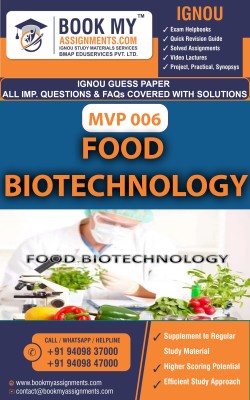IGNOU MVP 006 Food Biotechnology | Guess Paper | Important Question Answer |Master of Science in Food Safety and Quality Management (MSCFSQM)(Paperback, BMA Publication)
Quick Overview
Product Price Comparison
Introduction to Food Biotechnology:Overview of food biotechnology as a field of study, its significance in modern food production, and its impact on food quality, safety, and sustainability.Understanding the basic principles of biotechnology and its applications in the food industry.Biotechnological Tools and Techniques:Study of biotechnological tools and techniques used in food production and processing, including genetic engineering, fermentation, enzymatic processes, and cell culture techniques.Understanding of molecular biology techniques, such as recombinant DNA technology, gene editing (e.g., CRISPR-Cas9), and polymerase chain reaction (PCR), in food biotechnology.Genetically Modified Organisms (GMOs) in Food Production:Examination of the use of genetically modified organisms (GMOs) in agriculture and food production, including genetically engineered crops (e.g., herbicide-resistant, insect-resistant) and genetically modified microorganisms used in food processing.Understanding of the scientific principles, applications, controversies, and regulatory considerations surrounding GMOs in food.Fermentation and Fermented Foods:Study of fermentation processes used in the production of fermented foods and beverages, such as yogurt, cheese, bread, beer, and wine.Understanding of the role of microorganisms (e.g., bacteria, yeast) in fermentation, metabolic pathways involved, and factors influencing fermentation outcomes.Enzyme Technology in Food Processing:Overview of enzyme technology and its applications in food processing, including enzyme production, purification, immobilization, and utilization.Understanding of enzyme-substrate interactions, enzyme kinetics, and the use of enzymes in food production (e.g., starch hydrolysis, protein modification, flavor enhancement).Biopreservation and Shelf-Life Extension:Study of biopreservation techniques used to extend the shelf life of food products, including the use of beneficial microorganisms (e.g., lactic acid bacteria, bacteriocins) and natural antimicrobial compounds.Understanding of the mechanisms of action, applications, and limitations of biopreservation methods in food preservation.


